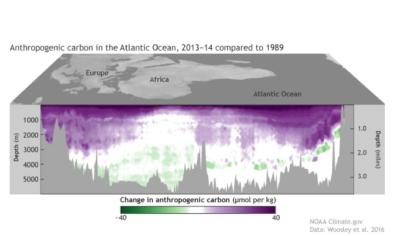Science Source
Interactive effects of temperature, food and skeletal mineralogy mediate biological responses to ocean acidification in a widely distributed bryozoan
- States that marine invertebrates with high-magnesium calcite skeletons may be especially susceptible to ocean acidification (OA) due to this form of calcium carbonate's elevated solubility
- States that, however, skeletal composition can vary plastically within some species, and it is largely unknown how concurrent changes in multiple oceanographic parameters will interact to affect skeletal mineralogy, growth and vulnerability to future OA
- Explores these interactive effects by culturing genetic clones of the bryozoan Jellyella tuberculata (formerly Membranipora tuberculata) under factorial combinations of dissolved carbon dioxide (CO2), temperature and food concentrations
- Finds that high CO2 and cold temperature induced degeneration of zooids (animals arising from another by budding or division) in colonies
- Finds that, however, colonies still maintained high growth efficiencies under these adverse conditions
- Results indicate a compensatory trade-off whereby colonies degenerate more zooids under stress, redirecting energy to the growth and maintenance of new zooids
- Results show that low-food concentration and elevated temperatures also had interactive effects on skeletal mineralogy, resulting in skeletal calcite with higher concentrations of magnesium, which readily dissolved under high CO2
Related Content
Headline

Jun 6, 2018 | NOAA Climate.gov
Cruises cut a slice through the Atlantic's carbon pie
Science Source
| Nature Climate Change
Detecting regional anthropogenic trends in ocean acidification against natural variability
T. Friedrich, A. Timmermann, A. Abe-Ouchi et al
Science Source
| Biogeosciences
Using present-day observations to detect when anthropogenic change forces surface ocean carbonate chemistry outside preindustrial bounds
Sutton, Adrienne J., Sabine et al
Science Source
| Estuaries and Coasts
Is Ocean Acidification an Open-Ocean Syndrome? Understanding Anthropogenic Impacts on Seawater pH
Carlos M. Duarte, Iris E. Hendriks, Tommy S. Moore et al


